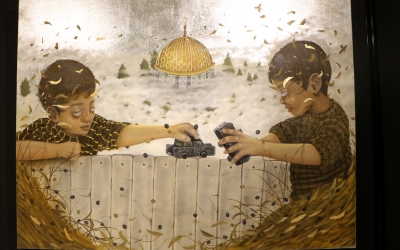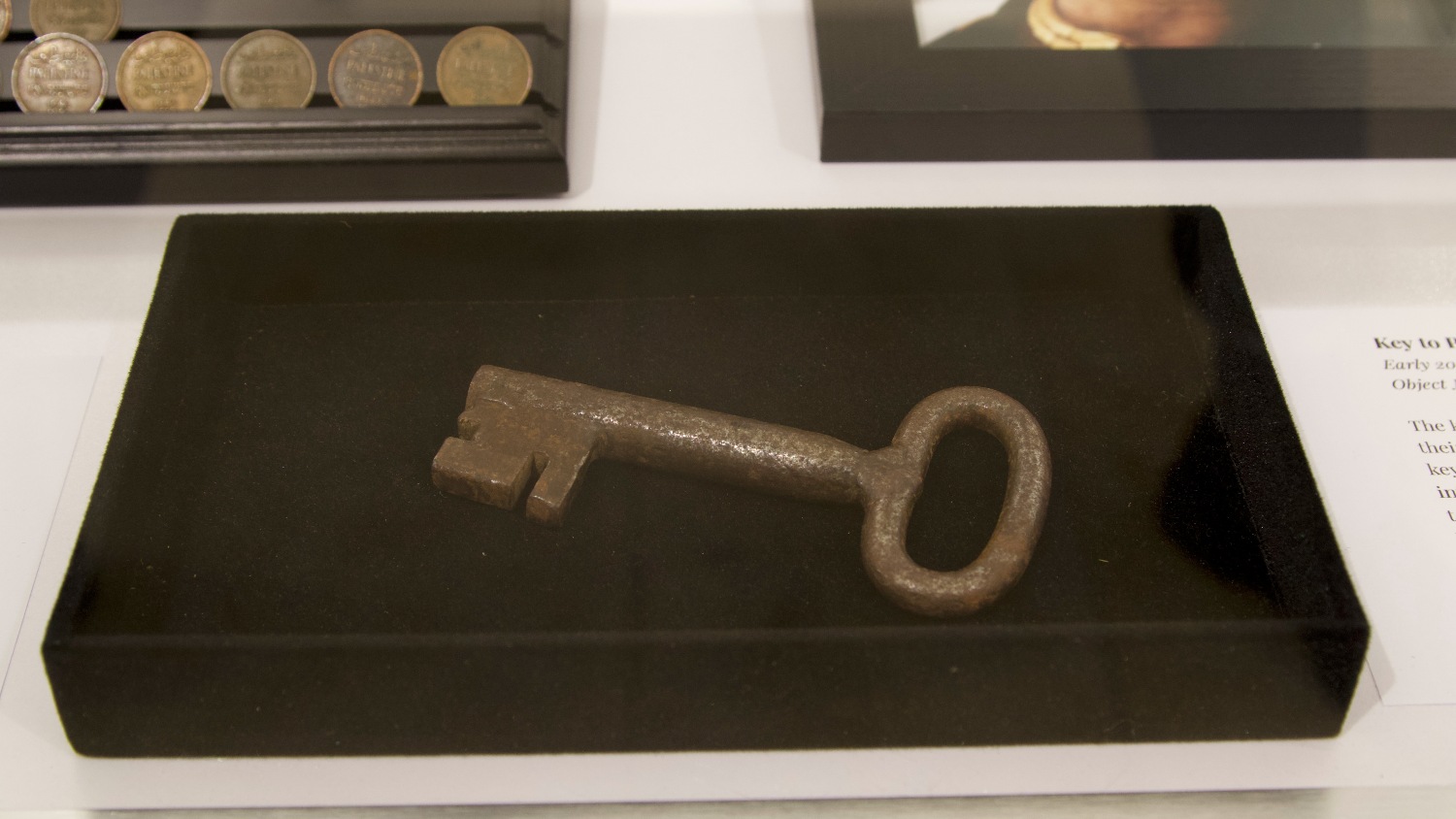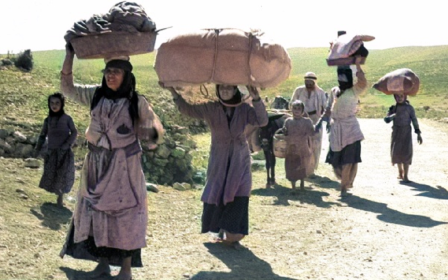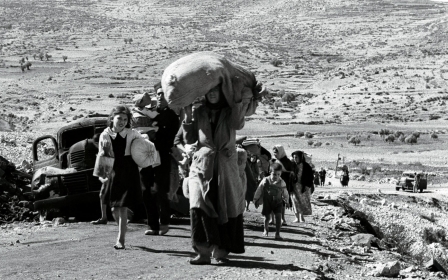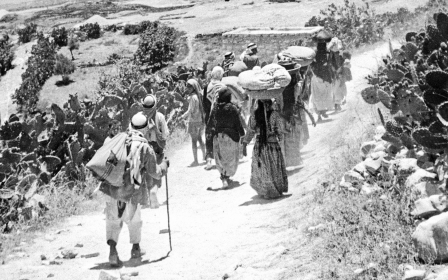Washington's Palestine museum sees increased attendance ahead of Nakba
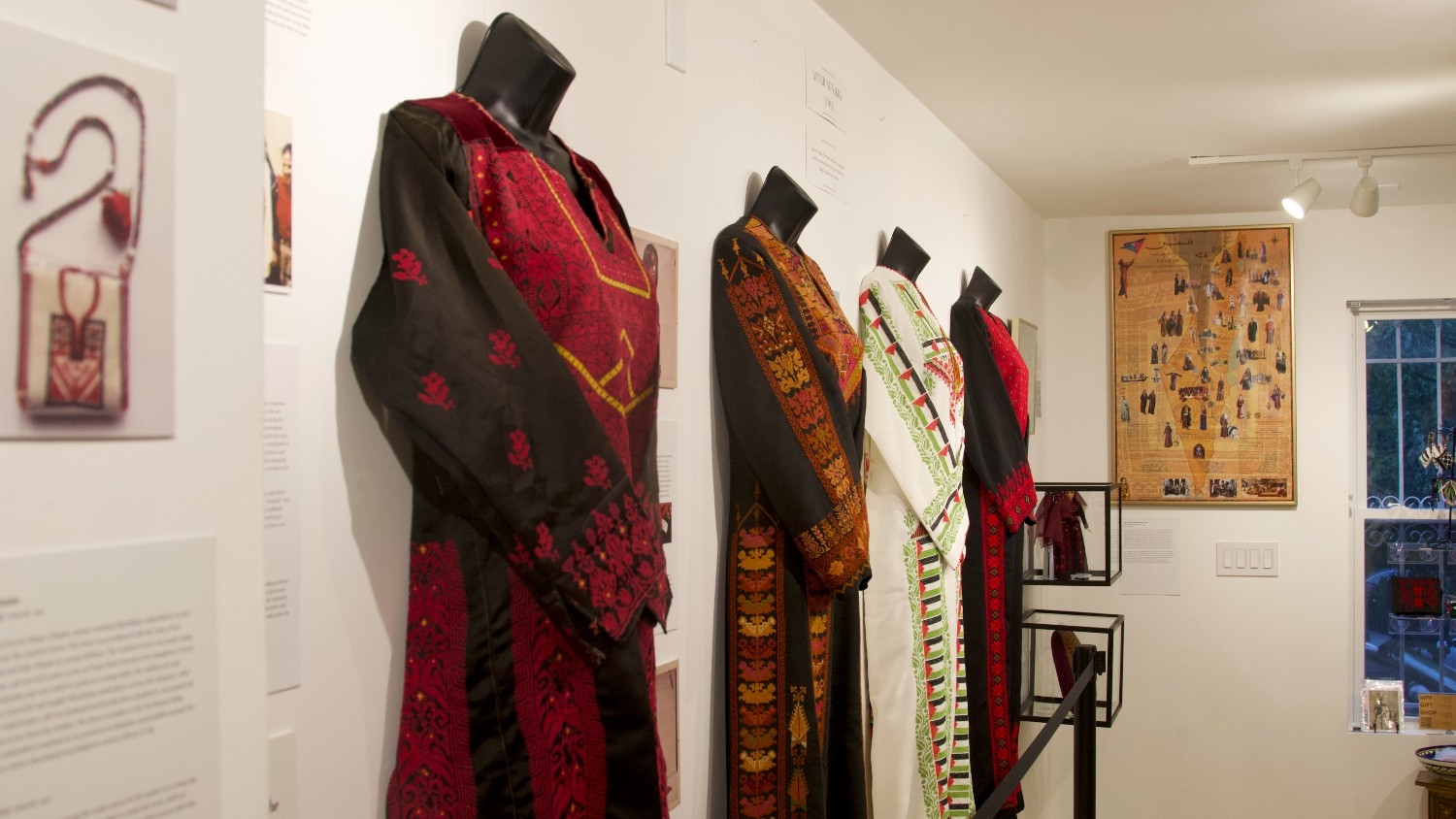
Ahead of the 75th anniversary of the Nakba, or catastrophe in Arabic, a small museum in Washington dedicated to narrating the history of the Palestinian people is receiving an unprecedented spike in visitors curious about Palestine.
While US politics, and up until recently, American perceptions, have skewed largely in favour of Israel, the museum's staff and founder say the increased attendance is part of a larger shift in attention towards the plight of Palestinians living under Israeli occupation.
"There is increased attendance to the museum this year so far, because we are also telling a story in a way that through arts and culture disarms people," Bshara Nassar, founder of the museum, told Middle East Eye.
He adds that they've had more visibility this year and are getting more people into the museum space.
The Museum of the Palestinian People provided Middle East Eye with data showing that the monthly average attendance in 2022 was 132 people. So far in 2023, that number has increased to 227 people per month, a 170 percent spike.
New MEE newsletter: Jerusalem Dispatch
Sign up to get the latest insights and analysis on Israel-Palestine, alongside Turkey Unpacked and other MEE newsletters
There are multiple factors for the increase in attendance, including the museum's own outreach efforts over the past year which have included co-sponsoring events in Washington and setting up tables at other events to raise awareness about its presence.
However, the ongoing violence towards Palestinians by Israeli forces, coupled with the lead-up to the Nakba anniversary, has also played a role.
The 15th of May is marked by Palestinians around the world as the Nakba, which refers to the ethnic cleansing of Palestine by Zionist militias making way for the creation of Israel in 1948.
In a premeditated military campaign, Zionist forces killed thousands of Palestinians, destroyed hundreds of villages and forcibly expelled 80 percent of the Palestinian population from their homeland.
"As a matter of fact, yes," said Julia Pitner, the museum's director of operations and programmes, after being asked whether the Nakba anniversary has helped to increase attendance over the past few weeks.
"Also, because of what happened at Aqsa, because there were demonstrations worldwide against what happened at the Aqsa Mosque," she said referring to the violence against Palestinian worshippers during Ramadan this year.
"There has been a lot more attention and people are curious now, which is good and bad at the same time. It's good because we want to have more attention on the Palestinian issue. It's bad because it only seems to come when there's violence.
Changing perceptions
In recent years, polling has reflected a change in American perceptions towards the Israeli-Palestinian conflict.
A Gallup poll released in March found that more voters identifying with the Democratic Party are sympathetic towards Palestinians than they are sympathetic to Israelis. The shift is the first since the poll started 22 years ago.
A poll from 2021 found that 51 percent of Americans opposed fully unrestricted aid to Israel if it continued to expand settlements in the occupied West Bank, which many global bodies describe as being in contravention of international law.
'We are basically the Palestine cultural embassy in Washington'
- Bshara Nassar, Museum of the Palestinian People founder
The increased attention to the museum has, however, not led to any visits by US lawmakers.
"Maybe Betty McCollum would like to come?" Pitner said.
She noted that American political institutions remain either pro-Israel or not pro-Israel.
"It's a challenge, too, because the politics of the United States vis-a-vis Israel and Palestine is very complex and then not complex at all. Because you have to be pro-Israel or not pro-Israel, especially on Capitol Hill. That's not the case at the grassroots level, however, and you're starting to see a lot of that swell up. And now there a few more representatives in Congress who want to talk about Palestine, and we'd love to invite them here."
Nassar said the museum is a non-profit organisation that's not focused on politics or working with politicians, but they would love to have them come to visit the museum and learn about Palestine's history.
And while no lawmakers have walked through its doors, Nassar noted that congressional staffers and people working at the US State Department have come to the museum on their own individual capacity simply out of curiosity.
They also recently had a group of people from the Brookings Institution, one of Washington's top think tanks, visit the museum.
"We're a cultural institution and a museum, and we welcome everyone," Nassar said.
'Genuine curiosity'
Nestled in a block of buildings a few blocks north of Washington's Dupont Circle, the museum is only a few minutes' drive from the White House, Capitol Hill, and the State Department.
It offers an array of different exhibits, from historical artefacts from the Nabataeans to Ottoman Palestine, all the way to modern-day items such as a new exhibit dedicated to Tatreez, or Palestinian embroidery.
The museum has been running since 2019 and was able to stay afloat through the Covid-19 pandemic by conducting virtual programming.
Now, with the museum fully open again, Pitner says the space sees a wide range of visitors, with many not knowing anything about Palestinians besides their name.
"I find that people who come here who've never heard of Palestine or who have heard a little bit about it and are curious, that they leave here quite happy that we're here," she said.
"It becomes a genuine curiosity because you don't hear about who they are, as a people even let alone individuals and the contributions that they were making."
The space is also within walking distance from Washington's Embassy Row, where many countries have their embassies located. Palestine has not had any form of embassy in Washington, and the closest they had to one - the Palestinian Liberation Organisation's office - was closed by former US President Donald Trump.
Now, the Museum of the Palestinian People is just one of a few places in Washington where people can learn about Palestine.
"We are basically the Palestine cultural embassy in Washington," Bshara said.
Ahead of the Nakba, which is on 15 May, the museum has been pushing out programming dedicated to exploring this history, including bringing Nakba survivors to speak about their experiences, book talks with Palestinian authors, and offering classes on Palestinian embroidery.
"The Nakba is coming up, 75 years of Nakba, which is a catastrophic and traumatic event for Palestinians. It is very important for us as Palestinians to remember it and to talk about it to raise awareness about that," Nassar said.
The Museum of the Palestinian People is located at 1900 18th St. NW, Washington, DC, on the corner of 18th and T Street. It is open on Fridays from 3pm to 8pm and on Saturdays from 12pm to 6 pm.
Middle East Eye delivers independent and unrivalled coverage and analysis of the Middle East, North Africa and beyond. To learn more about republishing this content and the associated fees, please fill out this form. More about MEE can be found here.


